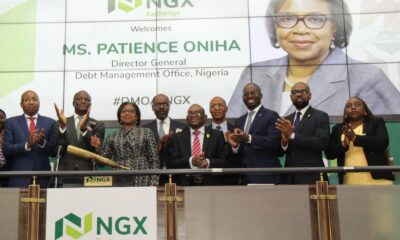The latest report from the National Bureau of Statistics (NBS) in its series on foreign trade in goods shows the total value of trade grew by +128.6% y/y to N26.8trn in Q4 ’23 vs +53.2% y/y in Q3 ‘23.
The total export value increased by 22.7% q/q to N12.7trn compared with N10.4trn recorded in Q3 ‘24. This can be partly attributed to c.20% depreciation of NGN/USD recorded in Q4 ‘23.
For FY2023, total exports increased by 34.2% y/y to N35.96trn. The import value increased by 56.04% q/q to N14.1bn from N9.0trn in Q3 ‘23. We note that imports were affected by the weaker naira following the fx liberalization policy.
For FY2023, imports increased by 40.4% to N35.92trn. Total trade as a percentage of nominal GDP (2023) stood at 30.4% in 2023, compared with 26.3% in 2022. In FY2023, Nigeria recorded a surplus of +N44.8bn.
According to the NBS report, the top six import sources were China N6.6trn (19.5%), India N2.8trn (N8.5%), USA N2.2trn (6.6%), Netherlands N1.8trn (5.3%), Brazil N810bn (2.4%), and the UK N688bn (2.0%). These countries collectively accounted for 44.4% of total imports in 2023. Imports from ECOWAS stood at N168bn, representing 19% of total imports within Africa.
Manufactured goods accounted for the largest share of imports, 51.2% and its import value grew significantly by 66.9%y/y. Following closely, petroleum oil products accounted for 33.42% of imports, and grew by 18.8%y/y. Raw materials accounted for 8.4%. Conversely, solid minerals registered a modest share of 0.53%. Agricultural goods followed suit with a 6.35% share, experiencing a notable growth in value of 22.3% y/y.
Regarding exports, the top six export destinations include Netherlands with exports valued at N4.5trn (12.6%), Spain N3.3trn (N9.4%), India N3.0trn (8.4%), the United States N2.6trn (7.3%), France N2.3trn (6.5%), and the Economic Community of West African States (ECOWAS) N2.2trn (6.2%). These destinations collectively accounted for 50.4% of total exports in 2023.
Crude oil accounted for 80.6% of total exports in 2023, its export value grew by 37.4% y/y to N29trn vs +46.4%y/y recorded in 2022. Based on a separate data from the NURPC, average crude oil production (condensates inclusive) in 2023 was 1.47mbpd compared with 1.38mbpd in 2022.
This is lower than the OPEC production quota for Nigeria which was 1.7mbpd.
Non-oil exports grew by 22.2% y/y to N6.9trn and accounted for 19.4% of total exports. Superior quality cocoa beans, cut flowers, sesamum seeds, soybeans, natural cocoa butter, soya beans, crude groundnut oil, frozen shrimps and prawns, shelled cashew nuts, crude palm kernel oil, and ginger among others were featured as top export commodities in 2023.
Nigeria exported goods worth N2.2trn to ECOWAS, compared with N1.7trn in 2022. This represented 60.2% of total exports within Africa. The most adopted port for exports in Q4 ’23 was the Apapa Port. Goods worth N11.9trn exited the country through this port which accounted for 94.4% of total exports. Other ports widely used include Tin can Island N(386.8bn), and Port Harcourt (N241.3bn)
GLOBAL FOCUS/REGIONAL TRADE
According to data from the World Trade Organization (WTO), merchandise trade declined by -8.2% y/y to US11.8trn in Q3 ‘23 compared with USD12.9trn recorded in the corresponding period of Q3 ‘22.
Meanwhile, on a q/q basis, total merchandise trade declined marginally by -1.4%. The decline can be partly attributed to weakened global demand as well as shifts in its composition toward domestic services, the effects of a stronger USD and rising trade barriers.
The Black Sea grain deal was terminated by Russia in July ’23, leading to rising food prices in import-dependent countries. However, Ukraine discovered a new corridor (the Danube River) to export its grains. As at end ’23, Ukraine had exported over 5.6 million metric tons of grain and other products through this corridor.
As at end-February ’24, the price of wheat moderated by -8.5% m/m to close at USD576.3/MT. The price of wheat recorded a downward trend m/m.
This was largely due to increased Russian exports, competitive pricing in the Black Sea region, abundant global stocks, diminishing international demand, and the prospect of another massive Russian crop.
Maize prices also moderated by -4.8% m/m to close at USD189.1/MT. Meanwhile, Cocoa prices increased by +34.1% m/m due to a decline in the supply prospects on the back of poor harvests in West Africa.
The El Niño weather phenomenon has been causing drier weather in Ghana and Ivory Coast, which are the world’s two biggest producers of cocoa beans.
Turning to China, despite the challenges posed by the property sector, trade exports increased by 0.9% q/q to USD861.6bn in Q3 ’23 compared with USD853.6bn recorded in Q2 ’23.
Notably, China’s PMI increased marginally to 50.9 in February ’24 from 50.8 in January ’24. We expect a loosening or a hold stance in the near term as China continues to seek ways to bolster its economy amid the downturn in its property sector.
In Africa, total merchandise trade declined by -3.3% q/q to USD312.6bn in Q3 ’23, compared with USD323.3bn in Q2 ’23. It is worth noting that the region recorded a trade deficit of -USD23.1bn in Q3 ’23. It is worth highlighting that resource rich economies like South Africa recorded a trade surplus in Q3 ’23.
Meanwhile, non- resource rich economies like Kenya and Egypt recorded trade deficits in Q3 ’23. The United Nations Conference on Trade and Development disclosed that, in 2019, intra-African trade accounted for less than 15% of total exports among African countries.
This suggests that there are potential benefits from increased regional trade. Overall, we expect the country’s external position to remain vulnerable to fluctuations in global oil price and weak domestic oil production.


 Forex3 weeks ago
Forex3 weeks ago
 Naira3 weeks ago
Naira3 weeks ago
 Billionaire Watch2 weeks ago
Billionaire Watch2 weeks ago



 Naira3 weeks ago
Naira3 weeks ago






 Naira2 weeks ago
Naira2 weeks ago




 Naira1 week ago
Naira1 week ago




 Naira4 weeks ago
Naira4 weeks ago






 Naira1 week ago
Naira1 week ago























